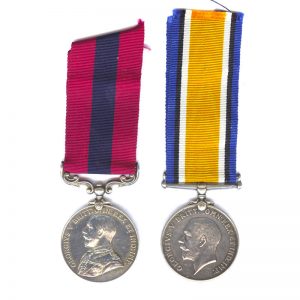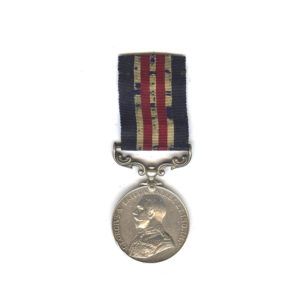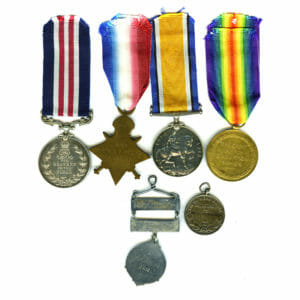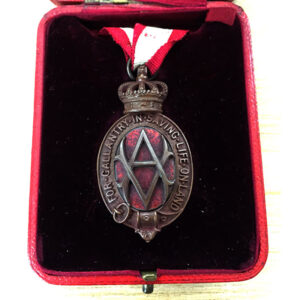Description
Distinguished Service Medal, GV, Petty Officer James “Jim” Clapp Bragg, HMS Orion, decorated for his services at the Battle of Jutland in the North Sea 31st May to 1st June 1916.
Officially Impressed: “193246 J.C. BRAGG, P.O., H.M.S. ORION. 31. May – 1. June. 1916”
A remarkable and rare confirmed award for the Battle of Jutland, the famous battle in the North Sea that was the largest battle at Sea of the Great War, the edge officially dated with the date of the battle.
Petty Officer James Clapp Bragg, became one of only 3 men of his ship to earn the Distinguished Service Medal for Jutland, out of about 202 issued to the entire Navy and Royal Marines.
He was the most senior rating awarded the medal from the ship, with 2 other awards going to a CERA in the Engine Room and John Mulraney, a Bombardier in the Royal Marine Artillery.
Awarded in the “Jutland” London Gazette of 15th September 1916, his service records noting: “Awarded the DSM for services rendered in the action in the North Sea 31 May – 1 June 1916, vide also London Gazette of 15/9/16”
His service records record that he had qualified on 28th November 1912 as a P.O. (G), meaning Petty Officer of the Gunnery Branch, whilst at the HMS Vivid II base, his next posting being the Orion on 4th February 1914 as one of her Petty Officer 1st Class. A specialisation in Gunnery would suggest the award was in relation for the good accuracy of the Orion’s 13.5 Inch cannons during the action which landed direct hits on multiple German Ships.
James was no stranger to the sea, being born on 21st November 1879, in Exeter, Devon.
At the age of 17 years old, he first signed up with the Royal Navy as a Boy 2nd Class on 17th April 1897.
His advancement through the ranks was swift, on 17th July 1897, he became Boy 1st Class, followed by Ordinary Seaman, when becoming of age on 21st November 1897.
He would then become Able Seaman (A.B.) on 27th May 1899 on board HMS Niobe.
Followed by Leading Seaman only 2 years later on 7th October 1901 whilst on board HMS Highflyer.
It took less than 2 years from then, to become a Petty Officer 2nd Class on 1st April 1903, whilst also on board HMS Highflyer.
By 1st January 1910, he had been promoted again to Petty Officer 1st Class at HMS Vivid II.
Going into the war, he had already been placed on board HMS Orion as a Petty Officer 1st Class since 4th February 1914.
He would served throughout the war on HMS Orion, from 4th February 1914 until 28th August 1918.
After the end of the war, he would continue his Naval Service, becoming Chief Pety Officer on 1st January 1919 on HMS Carnarvon.
Following an extensive career in the Royal Navy, spanning almost 23 years, he was demobilised on 10th February 1920, holding the rank of Chief Petty Officer.
He would however choose to continue his service in the capacity of the Coast Guard New Force from 1st June 1920.
This would not be the end of his involvement with the Navy, the 1939 Census lists a now 60 year old James Clapp Bragg as serving with the Coast Guard.
He was living at the No 1 Coast Guard station in Wyke Regis, just him and his wife.
HMS ORION IN THE GREAT WAR, BOMBARDMENT OF HARTLEPOOL AND BATTLE OF JUTLAND
The Orion was the very first and Lead Ship of the four Dreadnought Battleships built for the Royal Navy in the 1910s.
Her main armament was the newly produced BL 13.5 inch gun, a mammoth weapon designed for the Orion Class.
Early into the war during the Bombardment of Scarborough, Hartlepool and Whitby, the Orion was one of 6 dreadnoughts mustered by Vice Admiral Warrender along with 4 battlecruisers, that were sent out to intercept the German’s, after naval intelligence had intercepted their plans for an attack on British shores
The screening forces of each side blundered into each other during the early morning darkness and heavy weather of 16 December. The Germans got the better of the initial exchange of fire, severely damaging several British destroyers, but Admiral Friedrich von Ingenohl, commander of the High Seas Fleet, ordered his ships to turn away, concerned about the possibility of a massed attack by British destroyers in the dawn’s light. A series of miscommunications and mistakes by the British allowed Hipper’s ships to avoid an engagement with Beatty’s forces. One of these occurred when Orion’s lookouts spotted the light cruiser SMS Stralsund and failed to engage because Arbuthnot refused to allow the ship to open fire without a command from Warrender.
THE BATTLE OF JUTLAND
In an attempt to lure out and destroy a portion of the Grand Fleet, the High Seas Fleet, composed of sixteen dreadnoughts, six pre-dreadnoughts and supporting ships, departed the Jade Bight early on the morning of 31 May. The fleet sailed in concert with Hipper’s five battle cruisers. Room 40 had intercepted and decrypted German radio traffic containing plans of the operation. In response the Admiralty ordered the Grand Fleet, totalling some 28 dreadnoughts and 9 battlecruisers, to sortie the night before to cut off and destroy the High Seas Fleet.
On 31 May, Orion, under the command of Captain Oliver Backhouse, was the lead ship of the 2nd Division of the 2nd BS and was the fifth ship from the head of the battle line after deployment.
During the first stage of the general engagement, the ship fired four salvos of armour-piercing, capped (APC) shells from her main guns at the battleship SMS Markgraf at 18:32, scoring one hit that knocked out a 15-centimetre (5.9 in) gun and killed or disabled its crew.
About 19:15, she engaged the battle cruiser SMS Lützow at a range of 18,700–19,800 yards (17,100–18,100 m) with six salvos of APC shells and claimed to straddle her with the last two salvos.
These last salvos were actually fired at the destroyer SMS G38 which was screening the battle cruiser and laying a smoke screen.
Lützow was also fired at by Monarch during this time and was hit five times between the sisters. They knocked out two of her main guns, temporarily knocked out the power to the sternmost turret as well as causing a fair amount of flooding.
This was the last time that Orion fired her guns during the battle, having expended a total of fifty-one 13.5-inch APC shells.
Personal Life etc:
James Clapp Bragg, better known by those close to him as “Jim”, was born on 21st November 1879 in Exeter, Devon.
The son of Herbert and Lucy, his family had resided in Devon for generations.
During his Navy service he married Alice Amelia Scource in Buckfastleigh, Devon during August 1912. They would enjoy a long marriage of close to 50 years until her death in August 1961.
Jim would follow her soon afterwards, when he died at the age of 82 on 29th May 1962 in Devon.






